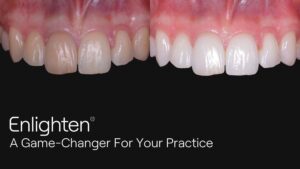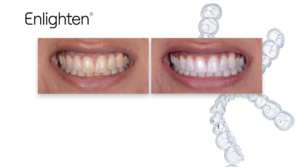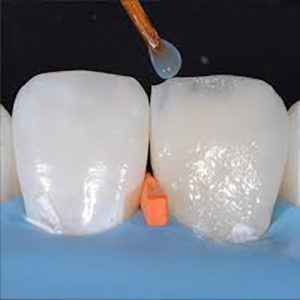Whitening your teeth? Here’s some food for thought
Considerations to explore to help identify the right time for teeth whiting for your patients.
As my children’s day ends and they are now fast asleep in bed, my working day is just beginning. I pour myself a coffee and transition into being a night owl as I sit typing away at my desk.
Moving onto the purpose of this blog, I will explore the answers to the questions:
- What other factors should be considered in identifying the right time for a patient to have teeth whitening?
- Is teeth whitening appropriate for everyone?
Is teeth whitening appropriate for everyone?
Minimally invasive dentistry holds a pertinent place within dentistry today, and teeth whitening is undeniably a treatment that fits into minimally invasive dentistry. To be able to maintain the desired shade there is an element of long term commitment required from patients. This involves either wearing home trays or returning to the dental surgery for various applications, both at varied intervals. So aside from the obvious clinical considerations, to ensure a patient can be eligible for teeth whitening, further considerations can to be explored to understand slightly more personal factors that will affect the patients long term success of teeth whitening.
There are basic requirements that every patient needs to commit to for the long term success of teeth whitening. Aside from these basic commitments, if it is possible to identify further the most ideal time for teeth whitening for each individual patient, this will surely help further in the long term success of teeth whitening.
What other considerations can be considered to help build the full picture?
- Personal priorities in the long term, health, personal and career.
- Personal priorities in the short term, health, personal and career.
- Current available time.
- Current obstacles affecting long term priorities health, personal and career.
- Current obstacles affecting short term priorities health, personal and career.
Factors and considerations explored.
It is certainly common for clinicians to speak generically about certain treatments, and I am confident in saying if we were to open a discussion in a study club, we would all be able to share our favourite descriptions that we use in describing certain treatments. These descriptions are frequently refined throughout our careers due to various changes, advances in the evidence or utilising other colleagues input that resonates within you. But ultimately it is easy to get stuck on the description using terminology that is easily understood by the lay person our patients.

There are specific factors on teeth whitening and any treatments from a medical legal standpoint that need to be discussed for every patient. This being said the way you choose to explain teeth whitening and specific factors on teeth whitening will vary if further considerations are taken into account, essentially allowing each conversation on teeth whitening to be very varied.
For the intent of sharing the most appropriate evidence based information on teeth whitening specific to individuals, it is necessary to fully understand how people’s opinions surrounding teeth whitening have formed. Once the contributing factors have been explored and you have identified how a patient feels about them, it is then easier to formulate your conversation, and gage if teeth whitening is appropriate for particular individuals at a certain stage. What should be considered in how people’s opinions can be formed?
Reasons why people may like to have teeth whitening.
- Triggered by seeing lots of pictures of smiles with white teeth.
- Magazines.
- Media.
- After reading an article about teeth whitening.
- A friend or family member may have done it.
- Family or friends recommendation.
- After noticing their teeth are a bit yellow in a picture or social media post.
- Soon to get married.
- Blogs.
Reasons why people may not want to have teeth whitening.
- They heard it is sensitive.
- It doesn’t last.
- People didn’t notice much of a change.
How are the reasons why people may want teeth whitening and the reasons why people may not want teeth whitening relevant?
Depending on what a person believes is the reason for wanting, or not wanting tooth whitening, it is your role as a dental professional to understand people’s views and deliver up to date evidence based research on tooth whitening relevant to them. So it is important to ask questions such as:
- How do you feel about teeth whitening?
- Have any of your friends or family ever had teeth whitening?
- Why do you want teeth whitening?
- What have you read about teeth whitening?
- Although you don’t need teeth whitening would you ever want it?
- What makes you want teeth whitening?
Tooth whitening undoubtedly contributes to oral health through possible motivating patients, and overall well being and is the least invasive treatment that can enhance someone’s smile. However despite this continue to remember it is not suitable for everyone.
Tooth whitening undoubtedly contributes to oral health
The treatment may be suitable but the time may not be suitable for an individual. How you identify someone’s thoughts is a complex matter in it’s own. It is your role to ask the right questions, to discover how a person feels about teeth whitening and how they have come to this conclusion. It is further your role to educate your patient on the relevant factors and considerations on teeth whitening that is relevant to each specific patient, so you are able to deliver optimal information.
Patient assessment forms are a simple way to extract information from patients and colleagues.
Patient assessment forms can include:
- How do you feel about teeth whitening?
- Would you be open to considering tooth whitening?
- Why may you consider tooth whitening?
- Why may you not consider tooth whitening?
- Do you know anyone who has had teeth whitening?
- How was their experience?
- Do you have time for teeth whitening?
- Do you know teeth whitening requires long term commitment, would you be able to commit to this?
The examples of questions above will help to begin to form the picture of a patients views on teeth whitening and this will enable you to identify the right timing for the patient.
Why is all the above important? Correct up to date relevant information needs to continue to be delivered to the public on teeth whitening so false myths are eradicated and evidence based research is presented in the correct manor for the specific individual. It is our responsibility as dental professionals to educate the public on the relevance of minimally invasive dentistry in oral health today.
In conclusion
Although clinically a patient may be suitable for teeth whitening, building a understanding on their suitability based on other factors could be valuable.
The above gives you the opening as a clinician to discuss tooth whitening as the most non invasive aesthetically tooth enhancing treatment in dentistry, with the intentions of enhancing a smile, and boosting patients enthusiasm with there overall hygiene regime leading to enhanced oral health.
› DIG DEEPER ‹

» Training
To become an Enlighten Whitening Expert and get CPD certified for free hit the button below to take our hour-long online training.
» eBooks
Learn how to dramatically increase the number of whitening treatments you do here.
» Websites
Or if you’re interested in knowing more about the Enlighten Teeth Whitening System, then give it a click right here.

» eBooks
Read up on the 6 tips that will perfect your anterior resin restorations here.
And to discover how you can achieve the aesthetic results you want when doing a single veneer with a single shade of composite, click here.
» Websites
If you want to learn more about the 2-day hands-on anterior composite masterclass with Dr Dipesh Parmar, click here.
» Podcast
Learn how to emulate the success of the movers and shakers in the dental industry from their own mouths, featuring the nuggets of knowledge from likes of Simon Chard, Andrew Moore, Tif Qureshi, Mark Hughes and many more.














